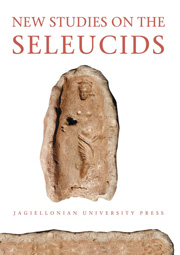Book contents
- Frontmatter
- Contents
- Abbreviations
- Local and Imperial Dates at the Beginning of the Hellenistic Period
- Europos-Doura Séleucide
- Suse et les Séleucides au IIIE siècle avant J.-C.
- Fondazioni di Antioco I Soter in Caria (St. Byz. s.v. Antiocheia)
- Antioco III e la politica onomastica dei Seleucidi
- Wie man ein „Verwandter“ des Königs wird – Karrieren und Hierarchie am Hofe von Antiochos III
- Achaeus, the Ptolemies and the Fourth Syrian War
- Imago mundi: expression et représentation de l'idéologie Royale séleucide. La procession de Daphné
- Nuove considerazioni sul Calendario Cappadoce. Persistenze e adattamenti dell'eredità achemenide nella storia di un piccolo regno tra mondo macedone, seleucide, attalide, partico e romano
- Demetrius III in Judea
- Reviews
Demetrius III in Judea
Published online by Cambridge University Press: 05 September 2014
- Frontmatter
- Contents
- Abbreviations
- Local and Imperial Dates at the Beginning of the Hellenistic Period
- Europos-Doura Séleucide
- Suse et les Séleucides au IIIE siècle avant J.-C.
- Fondazioni di Antioco I Soter in Caria (St. Byz. s.v. Antiocheia)
- Antioco III e la politica onomastica dei Seleucidi
- Wie man ein „Verwandter“ des Königs wird – Karrieren und Hierarchie am Hofe von Antiochos III
- Achaeus, the Ptolemies and the Fourth Syrian War
- Imago mundi: expression et représentation de l'idéologie Royale séleucide. La procession de Daphné
- Nuove considerazioni sul Calendario Cappadoce. Persistenze e adattamenti dell'eredità achemenide nella storia di un piccolo regno tra mondo macedone, seleucide, attalide, partico e romano
- Demetrius III in Judea
- Reviews
Summary
Absence of sources is why we know little about the last kings of the Seleucid dynasty and their reigns. One exception is Demetrius III (97/96–88/87 BC), a son of Antiochus VIII Grypus. What knowledge we have of him we owe to his role in the history of Judea at the end of Alexander Jannaeus' reign (103–86 BC). Josephus' historical works suggest that the king of Syria became involved in a conflict which broke out in Judea between Alexander Jannaeus and a group of his opponents led by the Pharisees. In doing so, he lent the latter his powerful military assistance. It proved so substantial that in a battle near Shechem Alexander Jannaeus' army was defeated. Only a lucky coincidence enabled him still to stay in power and soon to suppress his opposition (cf. Jos. BJ 1, 92–95; AJ 13, 376–379). This historical episode is exceptional in that Demetrius III was the first king of Syria since Antiochus VII Sidetes to stand on Judean soil and, at that, as an ally of one of local religious groups. It is this fact that makes the event worth looking at through the lens of not only the conflict between Alexander Jannaeus and the Pharisees, but also of Demetrius III's objectives in interfering in Judea's internal affairs.
A close study of Josephus' account of Demetrius III's involvement in Judea produces the impression that, despite its fairly comprehensive description of events, it contains some important gaps.
- Type
- Chapter
- Information
- New Studies on the Seleucids , pp. 175 - 182Publisher: Jagiellonian University PressPrint publication year: 2011

